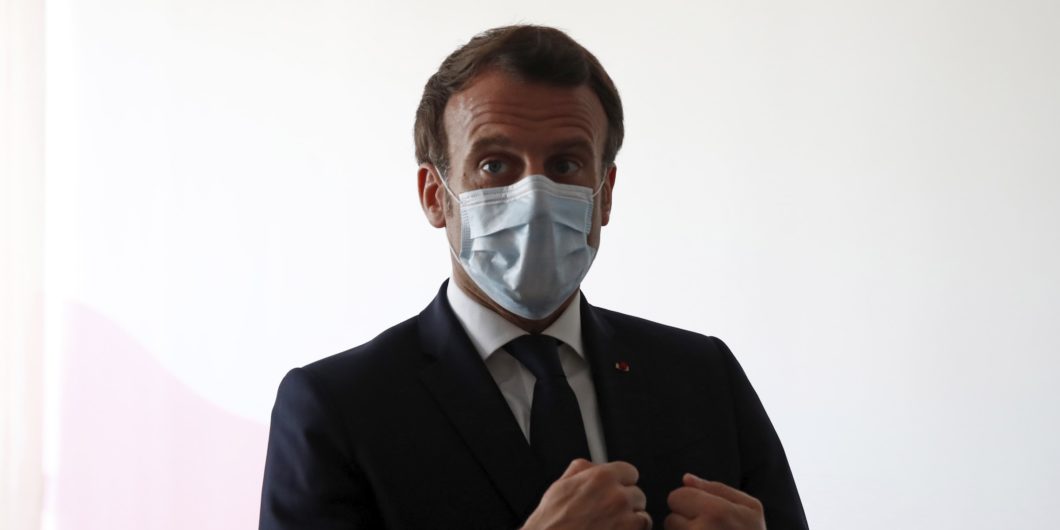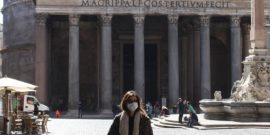If you listen to Democrats and their cheerleaders in the mainstream media, their leaders are just plain smarter and more caring.
Coronavirus and Public Trust: The View from France
The coronavirus situation in France, as elsewhere, seems unreal. Our lives are stopped and we don’t understand exactly why. We stay at home to support the “war” against the COVID-19 virus, but many don’t see clearly what the martial rhetoric of President Emmanuel Macron, his ministers, and mainstream media analysts is about.
First of all, questions have been raised about the health situation itself. If we study the numbers, it’s not that obvious that we are in a crisis situation. On April 14, a little more than 1.9 million people have been infected and a little more than 125,000 people died all over the world. Of course, these numbers are impressive. But just compare them to the numbers from the H1N1 epidemic in 2009: at least 60 million people contracted the illness and the WHO estimates that between 100,000 and 400,000 people died. At that time, we didn’t stop the economic life of almost every country on Earth. Of course, we can imagine that perhaps European politicians have some information about the true numbers of COVID-19 in China—where the communist leaders clearly lied and hid the truth. But we can only imagine, and that’s partly why the situation seems so unreal.
The contrast is striking between this blurry daydream and the public discourse: President Macron insists in all his speeches on the trust we should grant to science. He always refers to his scientific advisers. This scientistic discourse—and the insistence that science can and should define political outcomes is no longer a generally shared consensus. It is fitting that this small, strange virus is named after its crown-like shape, for like a king, it has exerted control over our world and even challenged the rule of the scientific, modern project.
For centuries we have collectively trusted science and human reason to “rule and possess” nature, as Descartes invited us to do. Sadly, after world wars, totalitarianism, and genocide, we are not so sure that human reason alone is the best path to wisdom and happiness. This crisis is only reinforcing that doubt.
The lack of trust is not only a fundamental issue for science. It’s even more of an issue for the politicians who claim to use science to direct their policies. We usually still believe in the authority of “people who know”—of scientists. But we always suspect politicians of lying and seeking their own interest rather than the country’s good. In France, this lack of trust is linked to a lot of strange and even contradictory political decisions. In particular, the government’s response to the virus outbreak is tainted by conflicts of interest: the former recent health minister, Agnès Buzyn, is married to the director of INSERM, the main public medical research center, and is said to be closely linked with the pharmaceutical industry. Three years ago, many people (including some doctors) accused her of imposing 11 compulsory vaccines to provide revenue for this industry.
A large part of the current debate comes back to this issue. Many citizens suspect that the health ministry’s opposition to Professor Didier Raoult, one of the most talented epidemic specialists, can only be explained by financial interest. Raoult suggests that using a treatment based on chloroquine (a common and inexpensive anti-malaria treatment) could be efficient for a lot of people infected by COVID-19. The health ministry, however, seems to be very cautious of—if not hostile to—this treatment. Once again, it’s very difficult for non-specialists to know the truth, but public trust in political speech is not strengthened by this strange soap opera!
The departure of Agnès Buzyn at the end of January, when the epidemic was expected to arrive in France, is also surprising and feeds suspicion—especially since Buzyn says that she warned the Prime Minister and the President, before her departure, about the pandemic risks.
The virus has driven home the reality that we cannot always know the truth about our own situation or trust that our leaders always have the right answers.
The general distrust and cynicism toward politicians are further reinforced by public attacks against citizens by President Macron and his ministers. For example, on March 13, President Macron gave a very solemn speech inviting us to stay at home. But he added that we had to vote for local elections two days later. It was a beautiful sunny Sunday and many French citizens took advantage of this election to go, for the last time, into parks or forests. Subsequently, President Macron told us that we were irresponsible to spend this Sunday outside! And now we begin to discover that many citizens were contaminated at voting locations. In response, Didier Lallement, Paris Prefect of Police simply explained that if somebody is contaminated, it’s his own fault: he shouldn’t have gone outside!
As another example, just over a month ago, certain government ministers said that France would not be reached by the virus. And even if France could be reached, it would be a very small number of cases and our healthcare system was ready to deal with it.
The strangest example is probably the government’s position on masks: three weeks ago, masks were judged incapable of preventing the spread of the virus and were considered to be possibly dangerous. Now, they are absolutely necessary to stop the virus’s spreading, and the government, which is so very careful about our health, ordered hundreds of millions of masks from China.
This succession of contradictory statements, embellished by ministerial insults and technocratic arrogance, cannot inspire trust in our political leaders or in the supposedly scientifically based policies they impose.
A similar skepticism of those in power is taking hold when it comes to the personal, political, and economic side of this crisis. We are now confined at home, receiving a massive flow of information, while we watch the rapid destruction of our fragile economy, and our moral condition is worsened by the closure of churches. Logically, most French people are looking to the “day after”—to what will happen after this confinement ends.
The main threat is the increasing anger of the population, especially from those confined in small apartments and cramped places while public disorder all around them slowly rises. This anger is already palpable: more than 100,000 legal complaints have been filed against the government for its catastrophic management of the crisis. But it could escalate to violence if the confinement lasts after the month of May.
Another threat is to our civil liberties: everybody can understand that an exceptional situation requires exceptional means. We can accept this lack of freedom, but only if we believe it’s temporary and not a test for social engineering.
Finally, the pandemic has also cast doubt on the reigning consensus concerning much of our social and economic life. This should give us some hope. Social networks rustle about new forms of economic, and more broadly human, organizations. Many have said that our towns are not “resilient.” But some people now dream of coming back to the countryside and developing a safer economy, reviving factories in France, and consuming local products. (The average citizen learned through this crisis that many of our drugs are produced in China, the heart of the epidemic!) Economic optimization and trade must be balanced with national security needs, which may require more production of certain essential medical devices and pharmaceuticals in France.
We have learned that old, largely abandoned political concepts could still be useful. The post-‘68 revolution told us that the family was archaic, but we now spend weeks on end with our families; they are now our entire horizon and protection. Modern social science and the politicians that follow it told us that nations were no longer important, and that they were insufficient for managing a crisis in an interconnected world. But the European Union is impotent in this pandemic crisis and everybody seeks safety in the guarantees that only nation-states can provide. We have heard that the march of history will soon destroy borders, making them archaic memories of barbarian times. Now, borders are our main protection against the virus’s spread.
This small, crown-like virus has wielded its power and widely changed our way of thinking about the world and our own life. It has driven home the reality that we cannot always know the truth about our own situation or trust that our leaders always have the right answers, even with the power of modern science and technocratic expertise on their side. It is even more difficult to know if all these new perceptions will be for better or for worse.



